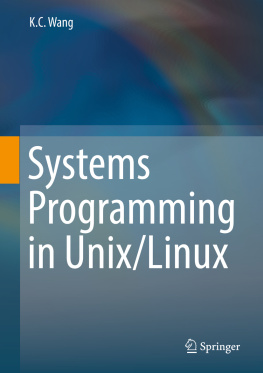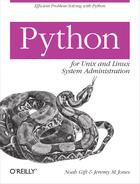Many of the designations used by manufacturers and sellers to distinguish their products are claimed as trademarks. Where those designations appear in this book, and the publisher was aware of a trademark claim, the designations have been printed with initial capital letters or in all capitals.
Ubuntu is a registered trademark of Canonical Limited, and is used with permission.
Debian is a registered trademark of Software in the Public Interest Incorporated.
CentOS is a registered trademark of Red Hat Inc., and is used with permission.
FreeBSD is a registered trademark of The FreeBSD Foundation, and is used with permission.
The Linux Tux logo was created by Larry Ewing, lewing@isc.tamu.edu.
The authors and publisher have taken care in the preparation of this book, but make no expressed or implied warranty of any kind and assume no responsibility for errors or omissions. No liability is assumed for incidental or consequential damages in connection with or arising out of the use of the information or programs contained herein.
For information about buying this title in bulk quantities, or for special sales opportunities (which may include electronic versions; custom cover designs; and content particular to your business, training goals, marketing focus, or branding interests), please contact our corporate sales department at corpsales@pearsoned.com or (800) 382-3419.
For government sales inquiries, please contact governmentsales@pearsoned.com.
For questions about sales outside the U.S., please contact intlcs@pearson.com.
Visit us on the web: informit.com
Library of Congress Control Number: 2017945559
Copyright 2018 Pearson Education, Inc.
All rights reserved. Printed in the United States of America. This publication is protected by copyright, and permission must be obtained from the publisher prior to any prohibited reproduction, storage in a retrieval system, or transmission in any form or by any means, electronic, mechanical, photocopying, recording, or likewise. For information regarding permissions, request forms and the appropriate contacts within the Pearson Education Global Rights & Permissions Department, please visit www.pearsoned.com/permissions/.
ISBN-13: 978-0-13-427755-4
ISBN-10: 0-13-427755-4
1 17
SECTION ONE: BASIC ADMINISTRATION
SECTION TWO: NETWORKING
SECTION THREE: STORAGE
SECTION FOUR: OPERATIONS
Every field has an avatar who defines and embodies that space. For system administration, that person is Evi Nemeth.
This is the 5 th edition of a book that Evi led as an author for almost three decades. Although Evi wasnt able to physically join us in writing this edition, shes with us in spirit and, in some cases, in the form of text and examples that have endured. Weve gone to great efforts to maintain Evis extraordinary style, candor, technical depth, and attention to detail.
An accomplished mathematician and cryptographer, Evis professional days were spent (most recently) as a computer science professor at the .
Throughout her career, Evi looked forward to retiring and sailing the world. In 2001, she did exactly that: she bought a sailboat (Wonderland) and set off on an adventure. Across the years, Evi kept us entertained with stories of amazing islands, cool new people, and other sailing escapades. We produced two editions of this book with Evi anchoring as close as possible to shoreline establishments so that she could camp on their Wi-Fi networks and upload chapter drafts.
Never one to decline an intriguing venture, Evi signed on in June 2013 as crew for the historic schooner Nina for a sail across the Tasman Sea. The Nina disappeared shortly thereafter in a bad storm, and we havent heard from Evi since. She was living her dream.
Evi taught us much more than system administration. Even in her 70s, she ran circles around all of us. She was always the best at building a network, configuring a server, debugging a kernel, splitting wood, frying chicken, baking a quiche, or quaffing an occasional glass of wine. With Evi by your side, anything was achievable.
Its impossible to encapsulate all of Evis wisdom here, but these tenets have stuck with us:
- Be conservative in what you send and liberal in what you receive. (This tenet is also known as Postels Law, named in honor of Jon Postel, who served as Editor of the RFC series from 1969 until his death in 1998.)
- Be liberal in who you hire, but fire early.
- Dont use weasel words.
- Undergraduates are the secret superpower.
- You can never use too much red ink.
- You dont really understand something until youve implemented it.
- Its always time for sushi.
- Be willing to try something twice.
- Always use sudo .
Were sure some readers will write in to ask what, exactly, some of the guidance above really means. Weve left that as an exercise for the reader, as Evi would have. You can hear her behind you now, saying Try it yourself. See how it works.
Smooth sailing, Evi. We miss you.
Modern technologists are masters at the art of searching Google for answers. If another system administrator has already encountered (and possibly solved) a problem, chances are you can find their write-up on the Internet. We applaud and encourage this open sharing of ideas and solutions.
If great information is already available on the Internet, why write another edition of this book? Heres how this book helps system administrators grow:
- We offer philosophy, guidance, and context for applying technology appropriately. As with the blind men and the elephant, its important to understand any given problem space from a variety of angles. Valuable perspectives include background on adjacent disciplines such as security, compliance, DevOps, cloud computing, and software development life cycles.
- We take a hands-on approach. Our purpose is to summarize our collective perspective on system administration and to recommend approaches that stand the test of time. This book contains numerous war stories and a wealth of pragmatic advice.
- This is not a book about how to run UNIX or Linux at home, in your garage, or on your smartphone. Instead, we describe the management of production environments such as businesses, government offices, and universities. These environments have requirements that are different from (and far outstrip) those of a typical hobbyist.
- We teach you how to be a professional. Effective system administration requires both technical and soft skills. It also requires a sense of humor.
T he organization of this book
This book is divided into four large chunks: Basic Administration, Networking, Storage, and Operations.
Basic Administration presents a broad overview of UNIX and Linux from a system administrators perspective. The chapters in this section cover most of the facts and techniques needed to run a stand-alone system.
The Networking section describes the protocols used on UNIX systems and the techniques used to set up, extend, and maintain networks and Internet-facing servers. High-level network software is also covered here. Among the featured topics are the Domain Name System, electronic mail, single sign-on, and web hosting.
The Storage section tackles the challenges of storing and managing data. This section also covers subsystems that allow file sharing on a network, such as the Network File System and the Windows-friendly SMB protocol.





